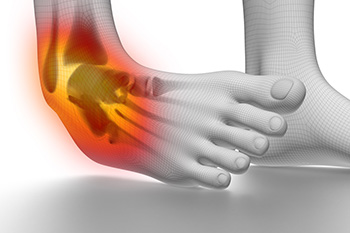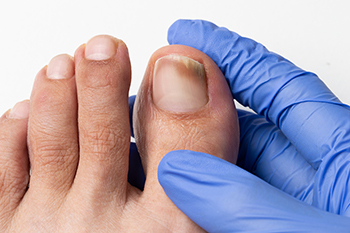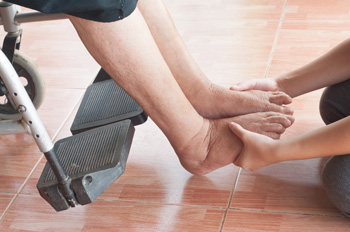Freehold (732) 294-9393
Freehold (732) 294-9393

Most children take their first steps between eight and 18 months of age. Initially, toddlers often exhibit flat feet or a tendency to turn their feet inwards due to muscle strength and ligament stiffness catching up with their overall development. This flat-footedness typically improves as the bones strengthen and the feet gain more muscle support. Additionally, some toddlers may walk with one or both feet turned inwards, known as in-toeing, which can originate from the foot, lower leg, or upper leg. In rare cases, toddlers may walk with their feet turned outwards, or out-toeing. Parents should also look for signs such as abnormally shaped toes, persistent or painful ingrown toenails, bunions, foot stiffness, limping, or a sudden change in the child's walking pattern. Other common causes of foot pain include ingrown toenails that persist, and deformities or lumps in the foot. If your child complains of pain while walking, limps, or demonstrates a significant change in their walking pattern, or if your child hasn't started walking by the age of two, a consultation with a podiatrist can help rule out potential developmental concerns. In cases of pain, limited function, or a sudden change in your child's walking pattern, it is a good idea to schedule an appointment with a podiatrist for a thorough exam and diagnosis.
The health of a child’s feet is vital to their overall well-being. If you have any questions regarding foot health, contact Dr. Henry Miller of New Jersey. Our doctor can provide the care you need to keep you pain-free and on your feet.
Tips for Keeping Children's Feet Healthy
If you have any questions, please feel free to contact our office located in Freehold, NJ . We offer the newest diagnostic and treatment technologies for all your foot care needs.

Ankle sprains occur when the ankle twists or turns, particularly in an inverted position, affecting the lateral ligaments. This strain forces body weight onto the outer edge of the ankle, resulting in stretching and potential tearing of ligaments that help to hold the ankle joint together. Repeated ankle sprains can lead to ankle instability, where the ankle turns inward during physical activity. Individuals who experience chronic ankle sprains may face thickening and irritation of previously sprained ligaments, causing impingement problems and discomfort near the ankle joint's edge. A severe variant, known as a high ankle sprain, damages supportive ligaments above the ankle joint. Recovery from a recurring sprain takes at least twice as long compared to more common sprains. For that reason, prevention is key. This involves performing exercises to strengthen ankle supporting muscles, wearing appropriate footwear for specific activities, and staying mindful of uneven surfaces. Prioritizing ankle health through preventive measures, seeking prompt medical attention, and following a comprehensive rehabilitation plan, can minimize the long-term effects of ankle sprains. Strengthening exercises, wearing proper footwear, and certain ankle braces can help to reduce the risk of ankle sprains. If you have sprained an ankle, it is suggested that you make an immediate appointment with a podiatrist for treatment.
Although ankle sprains are common, they aren’t always minor injuries. If you need your ankle injury looked at, contact Dr. Henry Miller from New Jersey. Our doctor can provide the care you need to keep you pain-free and on your feet.
How Does an Ankle Sprain Occur?
Ankle sprains are the result of a tear in the ligaments within the ankle. These injuries may happen when you make a rapid shifting movement while your foot is planted. A less common way to sprain your ankle is when your ankle rolls inward while your foot turns outward.
What Are the Symptoms?
Preventing a Sprain
Treatment of a Sprain
In many cases, the RICE method (Rest, Ice, Compression, and Elevate) is used to treat ankle sprains. However, you should see a podiatrist to see which treatment option would work best with your injury. In severe cases, surgery may be required.
It is important to ask your doctor about rehab options after you receive treatment for your injury. Stretching, strength training, and balance exercises may help the ankle heal while also preventing further injury.
If you have any questions, please feel free to contact our office located in Freehold, NJ . We offer the newest diagnostic and treatment technologies for all your foot care needs.

Toenail fungal infections, medically known as onychomycosis, can lead to brittle, crumbly, or ragged nails, and even separation of the nail from the nail bed. While completely curing toenail fungus can be challenging, there are effective treatments available to manage the condition. Toenail tissue is harder and thicker, which prevents antifungal creams from penetrating effectively. Even antifungal drugs taken in pill form have limited success, because toenails grow slowly and have low metabolic activity. Prescription topical products, in the form of clear lacquers, applied directly to the toenails may take up to a year to produce noticeable results, even if applied daily. For more severe infections, oral medications taken daily in pill form for approximately three months may have a higher rate of success, potentially about 80 percent. However, they can cause side effects such as stomach upset, diarrhea, and, in rare cases, liver damage. Laser treatments, a relatively new approach to combating toenail fungus, penetrate the nail tissue to break down the fungus. Some studies have reported success rates ranging from 60 percent to 75 percent. For advice with toenail fungal infections, it is suggested that you make an appointment with a podiatrist.
For more information about treatment, contact Dr. Henry Miller of New Jersey. Our doctor can provide the care you need to keep you pain-free and on your feet.
Toenail Fungus Treatment
Toenail fungus is a condition that affects many people and can be especially hard to get rid of. Fortunately, there are several methods to go about treating and avoiding it.
Antifungals & Deterrence
Oral antifungal medicine has been shown to be effective in many cases. It is important to consult with a podiatrist to determine the proper regiment for you, or potentially explore other options.
Applying foot powder on the feet and shoes helps keep the feet free of moisture and sweat.
Sandals or open toed shoes – Wearing these will allow air movement and help keep feet dry. They also expose your feet to light, which fungus cannot tolerate. Socks with moisture wicking material also help as well.
If you have any questions please feel free to contact our office located in Freehold, NJ . We offer the newest diagnostic tools and technology to treat your foot and ankle needs.

As people age, their feet undergo changes, leading to potential issues like falls, foot ulcers, and discomfort. It is important to evaluate the feet as an essential part of older adults' regular health regimen that can identify and address foot-related concerns. Foot pain and ailments are prevalent among the elderly, necessitating consistent foot maintenance. Some individuals may struggle with basic foot care tasks, such as regular examination, washing, drying, moisturizing the feet, and trimming toenails. Additionally, a routine foot check can identify common issues and help in fall prevention. If you are elderly or taking care of an older person, it is suggested that you make an appointment with a podiatrist to set up a schedule for regular foot examinations and necessary care.
If you need your feet checked, contact Dr. Henry Miller of New Jersey. Our doctor will attend to all of your foot and ankle needs and provide you with quality treatment.
Geriatrics and Podiatry
When people age, some common issues that may occur are bone density loss, dry skin, poor circulation, and rough brittle nails. These issues may also affect your foot health if the necessary steps are not taken to alleviate the problems.
It is important to take care of your feet because feet that are injured or diseased can affect your overall health. Having painful feet hinders your ability to do daily activities or may decrease your willingness to do the things that you need to do.
Visiting Your Geriatrician
As we age, health problems become more likely, so it is essential to visit your doctor for check-ups to ensure that you are doing the best you can to take care of your health. It is recommended to check your feet frequently for any possible cuts, bruises, swelling, corns or any other irregularities.
Taking Care of Elderly Feet
Cracked or dry feet can be treated by applying moisturizer often. It is also important not to wear old socks because the older the sock is, the higher the possibility there will be that there is bacteria there. Wear fresh socks and make sure they fit properly.
Proper foot health means that you can have a more active lifestyle and you will not be bogged down by pain. Foot health also leads to good circulation, which is paramount for overall health.
If you have any questions, please feel free to contact our office located in Freehold, NJ . We offer the newest diagnostic tools and technology to treat your foot and ankle needs.